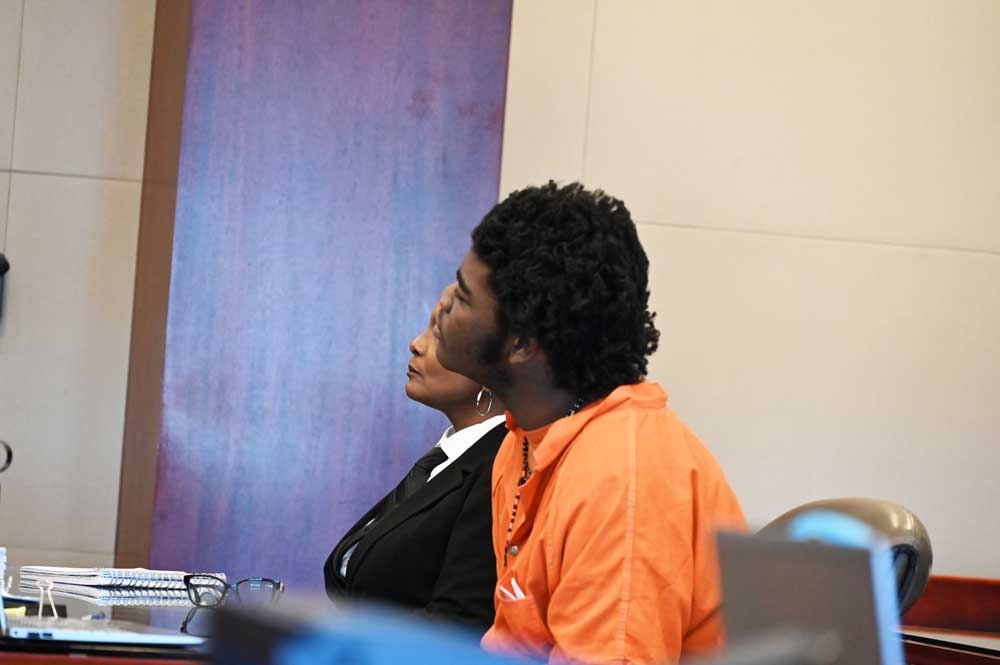
To hear Suzonne Kline, chief of mental health at the Florida Department of Corrections, mental health services in Florida prisons are so extensive, so thorough, so attentive, you’d want to get imprisoned just to get a piece of them. Certainly, no such comprehensive services exist in society at large, at least not as Kline described them, at least not for those without the means to pay for them. In Florida prisons, they’re at inmates’ disposal, free.
Undiscovered Kafka manuscripts aside, incarceration never sounded so good for the mentally ill, who make up 23 percent of the 86,000 men and women in Florida prisons.
Kline was testifying by zoom Wednesday during the first day of the sentencing hearing of Brendan Depa, the now-18-year-old former Matanzas High School student who pleaded to a first degree felony count of the aggravated beating of his teacher aide on Feb. 21, 2023. The open plea means the sentence is entirely in Circuit Judge Terence Perkins’s hands. Depa was charged as an adult. Perkins can sentence him as a youthful offender or as an adult. The adult charge carries a maximum penalty of 30 years in prison. The sentencing guidelines go nowhere near that.
The case has drawn national attention, mostly on the strength of a prurient surveillance video depicting Depa pummeling Joann Naydich, the aide, for several seconds before school staff, some of them with astonishing lack of urgency, pried him off. Depa himself would later tell a psychologist he was amazed it took so long. “It was almost like there’s an expectation that somebody would pull him off more quickly than what occurred,” said Greg Pritchard, the psychologist testifying for the prosecution, though Pritchard subjectively interpreted the observation as suggesting that Depa was blaming others for not prying him off.
In her testimony on Wednesday, Naydich, who is seeking punishment for Depa, asked that Perkins in his sentence “adhere to those guidelines and not give in to pressure of any sort, that could be external pressures.” She doesn’t know the judge. He is not susceptible to pressures, external or internal. His sentencing method is rigorously methodical and deliberate to the point of making objectivity appear to be cold calculus. But he’s not without emotions, guarded though they always are, and the human element in sentencing hearings has always played a role in his decisions. The lawyers know it.
Assistant State Attorney Melissa Clark will be arguing for prison time. Defense attorney Kurt Teifke will be arguing for some form of probationary diversion or house arrest without additional prison time: by the time he is sentenced, Depa will have been in lock-up in Jacksonville or in Flagler for 15 months. The two sides have lined up a series of witnesses, including expert witnesses–legal mercenaries, really–paid to make a case for the defendant one way or the other, unless they’re public employees, like Kline, in which case the testimony, like the mental health services she touted, is free.
It was in that context that Kline appeared from her Tallahassee office, as photogenic as she was credentialed (she’d been a a postdoctoral intern and a postdoctoral resident at Florida State Hospital, where inmates incompetent to stand trial are held, among others), and occasionally proud: she managed to name-drop that she’d recently testified before the Florida Senate. She was the prosecution’s first witness of the day.
She left the impression that the prison system on its own is a maverick in health care. That’s not exactly the case. Six years ago the Department of Corrections was sued in federal court by Disability Rights Florida for failing to comply with a 2017 settlement that was to address systemic failures regarding the treatment of people with disabilities. The suit outlined severe deficiencies. The two sides reached another settlement in 2021 outlining the department’s responsibilities. The two sides filed a compliance report just last month.
Depa is not physically disabled. He is autistic and suffers from a series of behavioral challenges, including self-control and a violent temper. He is medicated for various disorders. His behavioral and mental health are at or near the center of the sentencing hearing. So Clark’s strategy was two-fold: to attempt to demolish the perception that Depa would not receive necessary mental health services in state prison, and that done, to argue for prison time.
With Kline, who clearly knew the score–witnesses are generally prepped before they testify–Clark’s intention was to show that Depa’s mental health issues would be more than adequately addressed in prison. Kline described the processing of inmates with mental health issues almost as if they were entering any other mental health facility, down to the system’s euphemistic naming of landing lock-ups as “reception centers.” Prisoners entering the system always go to one of five such “reception” centers where they are evaluated and classified before they are dispersed into any of the system’s prisons for their permanent assignment.
At the reception center, Kline said, the inmates are graded on their impairment: the higher the grade, the more profound the impairment. “Just to be clear, all of our inmates have access to mental health services 24/7, regardless of their S-grade,” she said, referring to the more technical way the inmates are graded on their mental health needs. She referred to inmates with deeper mental health needs as “patients” who’d be cared for in “in-patient” facilities.
Treatment plans–Individual Service Plans–are created for each inmate that requires it. The ISP sounded oddly close to the IEP, the Individual Education Plan required for every special education student in public schools: the alleged misapplication of Depa’s IEP by school staff is playing a role in his sentencing.
Almost a quarter of the inmate population in Florida’s prison system suffers “a major mental illness,” Kline said, before continuing to describe the care protocols in terms no different than those used in civilian life. “Based on those S grades, they could be assigned to one of five different levels of care,” she said. The majority of inmates are in an “out-patient” setting, to the extent that inmates can ever be “out” while in prison. There are specially designated housing units for those who don’t mix well with others.
“For people that we know might be vulnerable in the general population,” Kline said, “we want to keep them separated but at the same time, the goal is always to get them at their highest level of functioning and to get them back in the general population. And some people are not able to do that, they end up spending most of their time in the residential continuum of care.”
The same system applies to inmates with autism and the series of disorders Depa suffers from. She said Depa’s disorders have all been dealt with and treated in other inmates, citing 3,969 inmates currently designated with the qualifier that means they have either an intellectual or a developmental disability, and are under routine care that needs monitoring. If inmates–or “patients”–are on psychotropic medicines, they are seen at a minimum once every 30 days.
“The minimum I think, on somebody who’s high functioning and that has a history of mental illness, but may or may not need meds, would be once every 60 days,” Kline said. “And that’s like the minimum. Again, that’s like kind of the starting point, and then everything increases from there.” Neither prosecution nor defense attorneys asked Klein to verify any of her claims with documented data.
Clark asked her directly: does the prison system provide mental health for autistic individuals? “The simple answer is yes, absolutely,” she said. “We don’t just treat the mental disorders, we treat intellectual disabilities, we manage neurodevelopmental disorders, and there might be differences between them, but basically, we’re trying to treat the symptoms, whatever they might be.” When Clark listed Depa’s disorders–Oppositional Defiant Disorder, ADHD, intermittent explosive disorder, disruptive mood dysregulation disorder, plus anxiety and depression–Kline’s answer was not different. At that point she did provide a statistic: 3,969 inmates have been designated as fitting those categories and needing “routine care or monitoring.”
There is more, like group therapy, and the higher the impairment, the more therapy: “So they will be required per week to come out for 10 to 12 hours of structured therapeutic activities, whether it’s a clinical group, whether it’s individual counseling, whether it’s medication management, you know, any of those things,” Kline said, “and that’s in addition to coming out for recreation therapy as well.”
If Teifke, the defense attorney, was attempting to find vulnerabilities in the reception process, he could not find specific points of entry. He made light of the prison system’s mission statement. But that was not exactly revealing, nor was questioning the rigors of the reception staff: “Do you really have personnel that are going to go over thousands of pages of documents to just assign a facility?” Teifke asked her.
“Our contracted providers are responsible absolutely for securing records on individuals and reviewing them, and that is part of their responsibility,” Kline said.
Though she appeared ready to produce numbers, Kline at no point was challenged to document generalities with specifics, asked to document cases of mental health hospitalizations the prison system could not handle, explain how arrangements may differ for youthful offenders, asked about the rates of suicide or self-harm among the incarcerated mentally ill, or the recidivism rate among those in Depa’s age and mental health category. Teifke limited himself to generalities of his own, or to ask Kline to reiterate what she’d already told Clark, or to the “quality control” mechanics of the intake process at “reception centers.”
Teifke in his questions was clearly concerned, should Depa be sent to prison, with his ability to make it to his release date in proper health. “It seems to me like the focus is not on any sort of post incarceration success,” Teifke said. Kline disagreed: “We start programming and fixating and trying to maximize their chances of a successful transition. So we work with DCF and trying to get them post, follow up care, and that type of thing.” (DCF is the Department of Children and Families.)
But in the end Teifke’s knowledge of the prison system’s mental health infrastructure seemed limited to surface or peripheral issues. It was an indication of his cross-examination’s failure to make a significant impact that Clark didn’t feel the need to re-direct Kline in further questioning of her own. In that sense, and the overarching absurdity of making the prison system’s mental health care infrastructure sound like a graft from the Mayo Clinic, Kline’s testimony was a complete tactical success for the prosecution.
![]()










